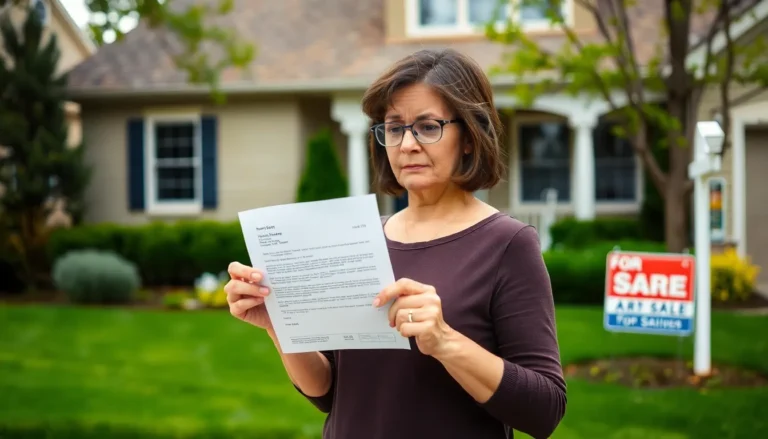As property values continue to rise across the country, many homeowners are feeling the pinch of increasing property taxes. This trend can spark concern and confusion, leaving residents wondering how these changes impact their finances and community services. Understanding the factors driving property tax increases is crucial for anyone looking to navigate this complex landscape.
Local governments often rely on property taxes to fund essential services like education, public safety, and infrastructure. However, as budgets tighten, property tax hikes can seem inevitable. This article explores the reasons behind these increases, the implications for homeowners, and what steps can be taken to address rising costs. By shedding light on this important issue, homeowners can better prepare for the financial realities ahead.
Table of Contents
ToggleUnderstanding Property Tax Increase
Property tax increases stem from rising property values and local government budget needs. Understanding these elements helps homeowners navigate financial implications effectively.
What Is Property Tax?
Property tax refers to taxes levied on real estate properties, such as homes and land. These taxes fund local services, including public education, infrastructure maintenance, public safety, and emergency services. The tax amount is typically based on property value and varies from one jurisdiction to another. Municipalities assess property values regularly to ensure taxes reflect market conditions.
How Property Taxes Are Calculated
Property taxes are calculated using a straightforward formula:
- Assessment Value: Local assessors determine a property’s market value through evaluations.
- Tax Rate: Local governments set a tax rate, expressed as a percentage or millage rate (tax per thousand dollars of assessed value).
- Calculation: The tax amount equals the assessment value multiplied by the tax rate.
For example, a property assessed at $300,000 with a tax rate of 1.5% incurs an annual tax of $4,500. Adjustments may occur during annual assessments, affecting overall tax liabilities.
Reasons Behind Recent Property Tax Increases

Recent trends indicate multiple factors driving property tax increases across various regions. Understanding these elements is vital for homeowners grappling with rising costs.
Rising Property Values
Rising property values directly influence property tax assessments. When local real estate markets strengthen, the assessed values of properties often increase. For example, if a neighborhood sees a 10% rise in property values, homes previously assessed at $300,000 may be revalued at $330,000. This increase in assessed value typically leads to higher property taxes. Enhanced demand for housing, new developments, and upgrades in amenities within the area also contribute to this phenomenon. Homeowners facing these valuation increases often experience significant financial impacts.
Increased Local Government Spending
Increased local government spending necessitates funding adjustments that commonly result in property tax hikes. Local authorities rely heavily on property taxes for essential services like education, infrastructure, and public safety. As expenses—such as salaries for public workers, facility maintenance, and emergency services—increase, municipalities may raise tax rates to meet budgetary demands. For instance, if a city budget grows by 5% while maintaining tax revenue, property tax rates may adjust accordingly to ensure continued service provision. Residents often bear the burden of these increased costs, reinforcing the connection between local spending and tax obligations.
Impacts of Property Tax Increase
Property tax increases significantly affect homeowners and renters alike. Understanding these impacts is essential for financial planning and community awareness.
Effects on Homeowners
Homeowners face financial strain due to increased property taxes. Higher taxes often lead to larger monthly payments, impacting budgets. Many homeowners might consider refinancing existing mortgages to manage costs. Increased taxes can also reduce disposable income, limiting funds available for home improvements or savings. In some cases, homeowners may find it challenging to retain their homes, especially if fixed incomes do not keep pace with rising expenses. Communities with higher property taxes may experience shifts in demographics, as individuals or families may relocate to more affordable areas.
Consequences for Renters
Renters experience indirect consequences from property tax increases. Landlords typically pass on tax costs through higher rent payments. These increased rental prices can strain household budgets, forcing renters to adjust spending in other areas. In high-demand rental markets, increased costs may lead to housing insecurity for lower-income tenants. Additionally, property tax hikes can discourage landlords from maintaining or upgrading properties, potentially affecting living conditions. Long-term, renters may face reduced housing options as landlords reevaluate investment strategies in response to rising taxes.
Strategies to Manage Property Tax Increase
Homeowners facing rising property taxes can implement various strategies to manage increased costs effectively. Utilizing financial planning and local resources can alleviate some of the financial burdens associated with property tax hikes.
Budgeting for Increased Costs
Budgeting becomes essential when property taxes rise. Homeowners should evaluate monthly expenses and prioritize necessary allocations. Key components to consider include:
- Reviewing Monthly Expenses: Assess current financial obligations and identify areas for potential savings.
- Creating a Savings Fund: Set up a dedicated fund for property taxes, contributing a specific amount each month to prepare for increased tax bills.
- Adjusting Discretionary Spending: Limit non-essential purchases to accommodate higher property tax payments without compromising essential needs.
Seeking Tax Relief Programs
Exploring tax relief programs provides additional avenues for homeowners to mitigate property tax increases. Available programs typically include:
- Homestead Exemptions: Many states offer exemptions based on age, disability, or income, reducing the assessed value of a primary residence.
- Tax Deferral Options: Certain jurisdictions allow homeowners to defer tax payments until property transfer or sale, easing immediate financial burdens.
- Local Assistance Initiatives: Community programs may exist to aid low-income homeowners, providing grants or assistance for property tax payments.
By actively budgeting and leveraging available tax relief programs, homeowners can navigate the implications of property tax increases with greater ease.
Rising property taxes present significant challenges for homeowners and renters alike. As property values climb and local budgets tighten, understanding the factors behind these increases becomes essential. Homeowners must remain proactive in managing their finances and exploring available resources to mitigate the impact of tax hikes.
By budgeting effectively and seeking relief programs, individuals can navigate this complex landscape. Staying informed about local market trends and government spending will empower homeowners to make informed decisions. Ultimately, addressing rising property taxes requires a combination of awareness and strategic planning to ensure financial stability in an ever-changing environment.




